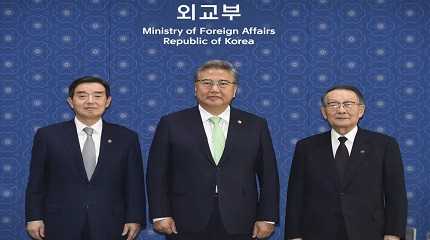
SEOUL, South Korea (AP) — South Korean President Yoon Suk Yeol met with Japanese business leaders on Monday and called for expanded technology cooperation between the countries, which he described as a key element in broader efforts to improve relations.
Yoon has met twice with Japanese Prime Minister Fumio Kishida in recent weeks, demonstrating their intent to overcome historical grievances that have strained ties for years and to strengthen cooperation in response to shared challenges, including a nuclear-armed North Korea and growing Chinese assertiveness in the region.
They will meet again this weekend at a summit of the Group of Seven leading industrialized nations in Hiroshima, where they will also hold talks together with U.S. President Joe Biden, who has been seeking to strengthen alliances with Japan and South Korea to counter North Korea and China.
Meeting with a delegation led by Mikio Sasaki, the former chairman of the board of Japan’s Mitsubishi Corp. who heads the Japan-Korea Economic Association, Yoon spoke glowingly about the potential for business cooperation in semiconductors, batteries and electric cars, and in building more resilient supply chains amid geopolitical uncertainties.
“Mutually complementary cooperation is possible between South Korean companies, which possess excellent manufacturing technologies, and Japanese companies, which are highly competitive in materials, components and equipment,” Yoon’s office quoted him as saying.
Sasaki told Yoon that exchanges between the countries are increasing as their relations begin to thaw and that his group will encourage Japanese companies to employ more South Korean students and young adults, according to Yoon’s office.
Ties between Japan and South Korea have long been complicated by disputes stemming from Japan’s colonial rule of the Korean Peninsula from 1910 to 1945.
Yoon’s meetings with Kishida came after his government announced in March a domestically contentious plan to use local funds to compensate a group of Korean plaintiffs who were enslaved by Japanese companies during the colonial period. The move was aimed at resolving a dispute over South Korean court rulings in 2018 that ordered Japanese corporations to pay reparations, which drew an angry response from Tokyo, which insists that all compensation matters were settled by a 1965 treaty that normalized relations between the countries.
The dispute spilled over into trade in 2019, when Japan tightened its export controls on key chemicals needed by South Korean companies to produce semiconductors and displays, prompting South Korea to file a complaint with the World Trade Organization. The countries also downgraded each other’s trade status and South Korea threatened to scrap a bilateral military intelligence sharing agreement that symbolized their three-way security cooperation with Washington.
Following a meeting between Yoon and Kishida in March, South Korea withdrew its complaint at the WTO and Japan simultaneously confirmed its removal of export controls on the chemicals. South Korea has also restored Japan to its list of preferred trading partners and Japan is now taking similar steps to put back South Korea on its own preferred list.




